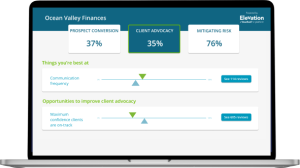Data is the backbone of financial planning. Advisers use data to analyse markets, build portfolios, and make recommendations to clients. But data shouldn’t just inform the plans you recommend to your clients. It should help to evaluate and improve the service you offer to them.
Consumer Duty puts a strong emphasis on the importance of collecting and using the right data. In particular, the FCA identifies client feedback as a vital data point for firms to demonstrate they are meeting the regulation.
As the 31st July deadline approaches, most firms should have a plan for what data they’ll collect. We’ve spoken with Rob Heath, Director of Wealth at IronMarket Wealth, about how you should use that data to improve your client experience.
What Data Do You Need to Collect?
You’ll need to collect a lot of data to comply with Consumer Duty. Advisers already collect data about complaints and target markets (although data collection here will most likely need to be expanded), but there will be some new areas to track.
Here are key types of data most advisers won’t have collected before, which are critical for Consumer Duty:
- Value for money
Advisers have always had to provide value to clients. Now, though, there is a greater expectation on them to evidence this. As value is so subjective, client feedback can be a useful data point to help this difficult task. VouchedFor’s enhanced client survey, Elevation, asks clients how they pay for financial advice (to evidence they understand their fees) and whether they feel on track to meet their goals to help firms evidence value for money. - Communications
Advisers must show that their communications enable clients to make informed decisions. This will be the first time most advisers have asked their clients for feedback on communication content, structure, and timing. Asking clients whether they feel your correspondence is clear is an obvious place to start, but testing how well information is understood is even better. Again, Elevation’s question on adviser fees helps to evidence whether firms have communicated this clearly. Elevation also measures clients’ understanding of potential risk. - Vulnerability
The emphasis on vulnerable clients has increased in Consumer Duty. Advisers now need to record what adjustments they have made as a result of the vulnerability, and if the client achieved as good an outcome as a non-vulnerable client. Firms should define what potential characteristics of vulnerability might be for their clients. For example, Elevation uses indicators including level of financial knowledge, age, and clients who are seeking advice for long-term care; it also allows firms to set their own criteria. - Consumer Outcomes
Firms must now act to achieve good consumer outcomes at every stage of the client journey. To show this, client goals should be clearly established at the outset, and progress towards them measured at regular intervals.
Making informed decisions from data
Data is only useful if it’s used to inform decision-making. Here are the four essential steps to establish your Consumer Duty data strategy:
- Analyse it
Once you have collected data, analyse it to identify patterns or trends. That a single client doesn’t understand risk may not tell you much; however, if the data shows that most clients don’t understand risk, your explanation may need improvement. Areas of overperformance are also useful to analyse. It could be the tools or techniques you use in that area could be used elsewhere to improve results. Rob Heath, Wealth Director at IronMarket, says that IronMarket “uses our member feedback and Elevation data to identify trends that allow us to focus on the areas that we could enhance. For example, client likelihood to recommend is really important when looking to grow our business and our member footprint”. IronMarket recently identified that they’re only asking 1 in 4 clients for a recommendation. - Act on it
Once you’ve analysed the data, you need to decide how to act to create better consumer outcomes. In IronMarket’s case, says Heath, “we take…action to address any developmental responses [and are] proactive in adjusting them. For example, we look closely at ‘[Client feels] on track to meet goals’, which is really important, not just for Consumer Duty, but thinking about the economic climate in the last 12-15 months. We’ve been able to focus on that and adopt an approach to build confidence in our members around that.”. - Monitor and Evaluate
Review the effectiveness of your action by monitoring performance against a defined KPI or industry benchmarks. The aim is to identify if further action is needed.
At IronMarket, Heath uses Elevation, from VouchedFor. “You can track progress almost day to day. This allows me to monitor and evidence improvement and, most importantly, further enhance our member experience.” - Reporting
Consumer Duty requires firms to report on the data they’ve collected and what they’ve done as a result of reviewing it. It’s essential to keep good records of your data, analysis, and actions, as well as their effectiveness and any further action you are taking as a result.
The power of feedback
While some Consumer Duty data will be hard facts, most will be subjective, based on client feedback. Heath is a strong advocate for the power of client feedback, quoting IronMarket’s mantra, “‘not everything that counts can be counted’. It’s more than just a number…it’s about looking beyond that to what our members are truly telling us.”
Recording the right data is essential for advisers to comply with Consumer Duty and some of the required data won’t have been collected before.
A much greater emphasis on client experience will change how and when firms ask for feedback.
However, it’s putting that data to work which will create a better business and in turn, better consumer outcomes.
___________________________
Elevation is an enhanced client survey from VouchedFor. It uses client feedback to drive business growth. Powered by 250,000 clients’ feedback, Elevation shows advice firms and advisers the specific actions they can take to meet the Consumer Duty and drive revenue growth.
Elevation offers completely private feedback, industry benchmarks, and a real-time Consumer Duty Report. That’s why more than 1,000 advisers from leading advice firms have chosen Elevation as their preferred survey solution for Consumer Duty.
To find out how Elevation can help you, or if you’re interested in getting content to help you meet your Consumer Duty, contact elevation@vouchedfor.co.uk




